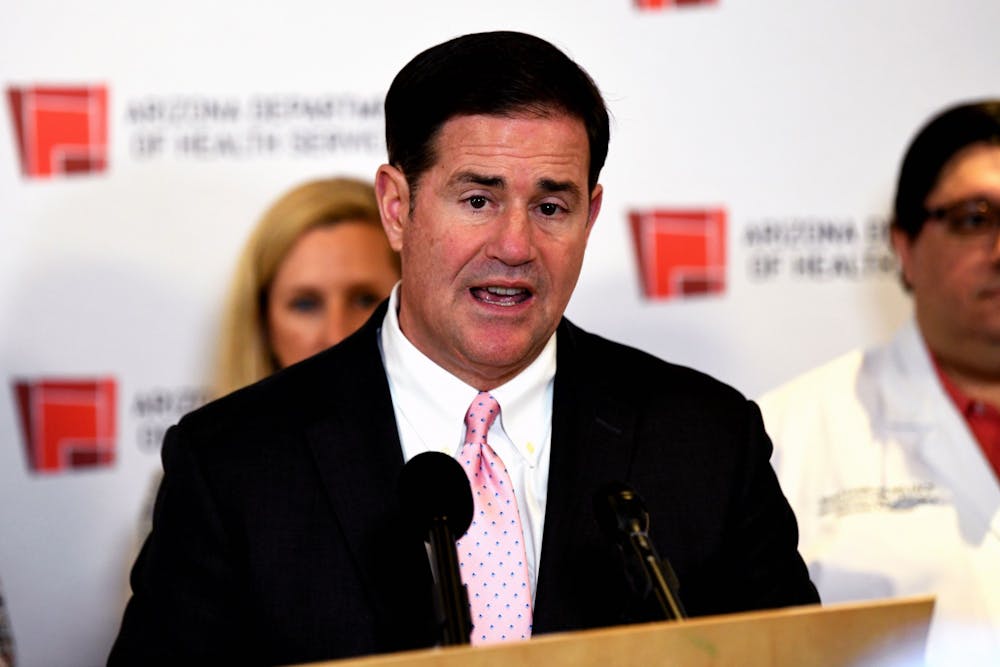Gov. Doug Ducey lifted COVID-19 occupancy restrictions for Arizona businesses in an executive order Friday. Restaurants, bars, theaters, gyms, water parks and bowling alleys can open with 100% capacity, but precautions like social distancing and mask wearing are still in place.
The University is assessing the executive order and how it may impact operations on ASU's campuses, a spokesperson said Friday.
ASU has yet to announce the delivery mode of graduation but in a February meeting with The State Press, President Michael Crow said the University plans for the Fall 2021 semester to be on campus and in person.
The University reported eight active COVID-19 cases among employees and 73 among students on Thursday.
In a Twitter thread, the executive order announcement was the fourth of five tweets celebrating a seven week decline in case numbers and how "Unlike other states, we never did a shutdown here in Arizona."
In a statement, Ducey said "Today's announcement is a measured approach; we are not in the clear yet," and reminded Arizonans to continue "practicing personal responsibility."
Spring training can operate once a plan is approved by the Arizona Department of Health Services.
Will Humble, former director of the ADHS, said on Twitter Friday, "The former 'capacity limits' were just on paper. They were never actually enforced" and called the executive order "a big giant nothing burger."
Humble, who is currently the director of the Arizona Public Health Association, has been vocal throughout the pandemic about what mitigation factors work, how local and state government should be reacting and what community members can do to stay safe.
"At least (Ducey) and (ADHS Director Cara Christ) are finally being honest about the fact that there are no mitigation measures in bars, restaurants and nightclubs," Humble tweeted.
Nothing in the Friday executive order gives businesses assistance or guidance on how to safely return to 100% capacity while maintaining six feet of distance, the recommended amount of space between persons to prevent spread of the coronavirus.
The executive order also makes it so mayors and other local entities cannot implement "extreme measures that shut down businesses."
On Tuesday, Ducey received his first dose of the Pfizer vaccine at State Farm Stadium several hours before other Arizonans 55 years and older could register for appointments at the site. This week, Arizona announced it will no longer use numbered phases for vaccine rollout, using instead an age-based model.
On Friday, ADHS added more than 2,000 confirmed cases to the state's count, bringing cumulative totals to 823,384 cases and 16,269 deaths.
In a statement, Ducey said "With the vaccine rollout advancing rapidly, we continue to have hope for the future."
According to data from ADHS, a little over 18% of the state's population has received a vaccine – almost half of the recipients who have received at least one dose have been white. Data is not broken down by household income but low-income seniors who are eligible are facing more inequity and challenges than others.
Last week, Texas became the largest state to lift its mask mandate, the state's Gov. Greg Abbott going against federal health guidance that says the pandemic is still ongoing and that has cautioned against ending safety measures in one fell swoop.
Other states including Alabama, Mississippi, Iowa and Montana have rolled back mask mandates while California, New Mexico, Wisconsin, Delaware, Rhode Island and Kentucky are among the only states still advising citizens stay home.
Reach the reporters at pjhanse1@asu.edu and follow @piperjhansen on Twitter.
Like The State Press on Facebook and follow @statepress on Twitter.
Continue supporting student journalism and donate to The State Press today.

Piper Hansen is the digital editor-in-chief at The State Press, overseeing all digital content. Joining SP in Spring 2020, she has covered student government, housing and COVID-19. She has previously written about state politics for The Arizona Republic and the Arizona Capitol Times and covers social justice for Cronkite News.




